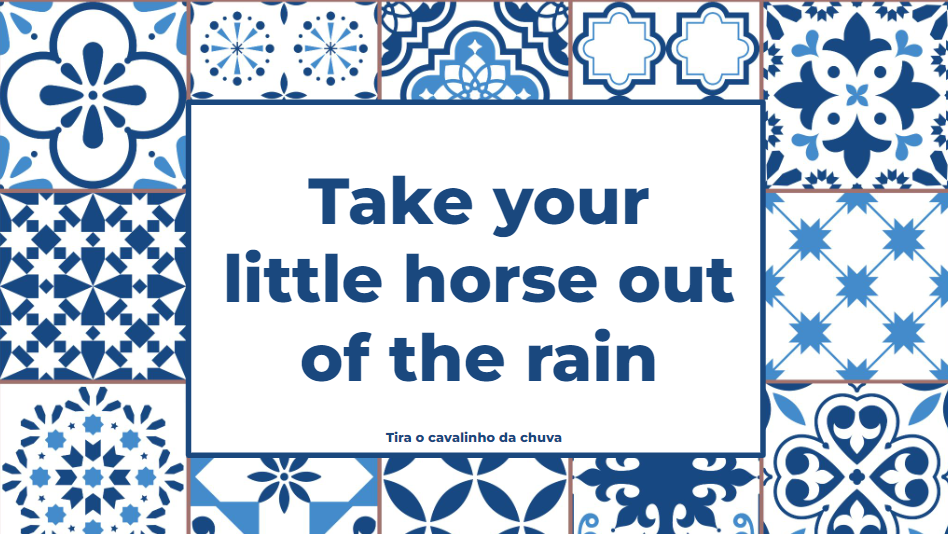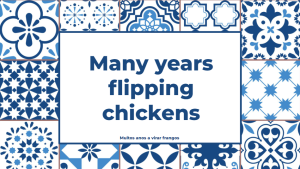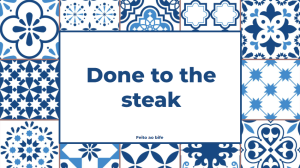The hilarious world of Portuguese sayings
When Chickens, Fleas, and Donkeys Teach You Life Lessons
If you’ve ever found yourself chatting with a Portuguese person, you’ve probably come across some sayings that, when translated, sound completely absurd. The Portuguese have a treasure chest of expressions that use animals, vegetables, and even inanimate objects to dish out wisdom. Ready for a linguistic rollercoaster? Hold on to your chickens and let’s dive in!
Take your little horse out of the rain, “tirar o cavalinho da chuva”
Translation: You better give up on that hope. This saying is a polite (but hilarious) way of telling someone their hopes are futile. Picture a sad, tiny horse standing in the rain, waiting for something magical to happen. The Portuguese are basically telling you to save your horse from a soggy disappointment and move on. It’s kind of advice, really.
I am that I can’t, “estou que nem posso!”
Translation: This is one of those classic Portuguese expressions that perfectly captures a state of extreme frustration or discomfort, like saying “I’m so tired/stressed/angry that I can barely function!” It’s often used when you feel overwhelmed, out of patience, or just on the verge of losing it.
Whoever has a mouth can go to Rome, “Quem tem boca vai a Roma”
Translation: If you have a mouth, you can get to Rome. Reality check: If you’ve got a mouth, you can do many things (talk, eat, make weird noises when you’re bored), but getting to Rome? That’s a stretch. Portuguese wisdom, however, suggests that as long as you can ask for directions, you can find your way anywhere. But in today’s world, your GPS might have a slight disagreement.
A barking dog doesn’t bite, “Cão que ladra, não morde”
Reality: Really? Have you seen my neighbor’s Chihuahua? The Portuguese are telling you not to worry about people who talk big because they won’t actually do anything. Well, that’s all well and good until you meet an actual barking dog. So if you encounter a barking dog in Portugal, it might be a safer bet to just… cross the street. Fast.
Many years flipping chickens, “muitos anos a virar frangos”
Translation: I’ve been doing this for years! When someone says they have “muitos anos a virar frangos,” it means they have a lot of experience at something. Also, the visual of someone flipping chickens for years is pretty hilarious. Imagine someone at a BBQ pit, flipping away like a poultry ninja. In essence, it’s the Portuguese way of saying, “I’ve seen it all—don’t worry, I’ve got this!”
Better a bird in the hand than two flying, “mais vale um pássaro na mão do que dois a voar”
Translation: It’s better to have one bird in your hand than two in the sky. Reality: This sounds more like a warning about juggling. Have you ever tried holding a bird? Not a great experience. But the saying is all about appreciating what you have rather than chasing something you might never catch. That is unless the thing you have is squawking and pecking at your fingers. Then maybe you’d prefer the birds in the sky.
Making a storm in a glass of water, “fazer uma tempestade num copo de água”
Translation: Drama. Pure drama. This saying is about making a big deal out of something small, but the image is hilarious. Imagine a tiny little thunderstorm trapped inside a glass, with little miniature clouds and rain. It’s the perfect way to describe someone who blows things way out of proportion. Now every time you hear someone being overly dramatic, picture them standing with a tiny umbrella over a glass of water.
“Isso é canja”, that’s chicken soup
Translation: Piece of cake! In Portuguese, if something is super easy, it’s “canja” (chicken soup). Why chicken soup is considered simple is anyone’s guess. Maybe because it’s so comforting and straightforward to make? Either way, next time you ace something, don’t say it was a walk in the park—say it was chicken soup! Everyone will agree that it’s much tastier.
“Agora é que a porca torce o rabo”, now the pig twists its tail
Translation: The pig’s tail is twisted, so things are getting serious. Have you ever thought about the moment a pig’s tail starts twisting as a sign that things are going wrong? Neither have we. But in Portugal, this saying signals that things are about to get complicated. Forget the calm before the storm – watch out for the pig with the curly tail!
“A galinha da vizinha é sempre melhor do que a minha”, which is – the neighbor’s chicken is always better than mine
Translation: Grass isn’t greener; chickens are juicier. This is a great twist on the old “the grass is always greener” phrase. The Portuguese decided chickens were a better metaphor. It perfectly captures that feeling of looking at what others have and thinking it’s better—whether it’s cars, jobs, or yes, even chickens. Meanwhile, your own chicken is looking at you like, “Seriously?”
Pulga atrás da orelha”, flea behind the ear
Translation: Something’s fishy, or rather, fleasy. Portuguese people say they have a “pulga atrás da orelha” when they’re suspicious or wary of something. Who can blame them? If you had a flea behind your ear, you’d be suspicious too! It’s a fantastic mental image and makes perfect sense when you consider that nothing good ever comes from finding a flea in that location.
“Fia-te na Virgem e não corras”, You trust in the Virgin, and don’t run
Translation: Relying on divine intervention, are we? This is basically the Portuguese way of saying, “You should have done something yourself instead of waiting for a miracle.” If you’re late for work and praying the boss will also be late, this saying applies. Next time, just run. Don’t wait for divine help!
Done to the steak, “feito ao bife”
Translation: You’re in trouble now. This phrase is used when someone has gotten themselves into a tight spot—”feito ao bife” means they’re cooked, like a steak! Whether you imagine yourself as a well-done steak or a rare one, it’s never good news. The Portuguese have a way of turning food into metaphors for disaster—hopefully, you won’t end up too crispy.
“Fazer das tripas coração”, make your guts into a heart
Translation: Put your heart into it, even if it guts you! This graphic expression means giving your all, even when it’s tough. The idea of turning your intestines into a heart is both poetic and kind of gross. But that’s the point—you’re really going above and beyond, even if it feels like you’re disemboweling yourself to get there!
“Há mais marés que marinheiros”, there are more tides than sailors
Translation: There are more opportunities than people to take them. The Portuguese, being a seafaring nation, know their tides! This saying is all about patience and optimism—if you miss one opportunity, don’t worry, another one will come. So if you’re not getting your way, just wait for the next wave. And hopefully, it won’t drown you.
“De pequenino se torce o pepino”, a cucumber is bent while it’s young
Translation: Start bending your cucumbers early in life! This peculiar phrase is all about how habits and behaviors form at a young age. If you want to shape someone’s character, you have to start early. Why a cucumber? Who knows, but it’s a perfect image of how tricky it can be to change things once they’ve matured. Plus, cucumbers aren’t known for being the most rebellious vegetables.
“Água mole em pedra dura tanto bate até que fura”, soft water hitting a hard stone will eventually make a hole
Translation: Persistence pays off. This classic Portuguese proverb might sound like an ancient physics experiment, but it’s really just a fancy way of saying “keep trying, you’ll get there eventually.” The image of soft water persistently hitting a rock until it wears it down is both inspiring and kind of terrifying. Don’t underestimate the power of dripping water, or Portuguese determination!
“Cada macaco no seu galho”, each monkey on its own branch
Translation: Stick to your own lane. This saying is a polite way of telling people to mind their own business. Each person (or monkey, in this case) has their own “branch” to swing from, and it’s best not to meddle in others’ affairs. Unless you’re feeling particularly like a cheeky monkey, in which case… grab a banana and join the fun!
“Pão, pão, queijo, queijo”, Bread, bread, cheese, cheese
Translation: Let’s call things as they are. When the Portuguese pull out this phrase, they’re asking for honesty. “Pão, pão, queijo, queijo” means you’re being straightforward—what you see is what you get, no buttering up (pun intended). It’s the perfect saying for when you want to cut through the nonsense and get straight to the good stuff: bread and cheese!
“Quem não tem cão caça com gato”, who doesn’t have a dog hunts with a cat
Translation: If life gives you lemons, make lemonade—with a cat. This delightful saying encourages resourcefulness. If you don’t have the ideal tools (like a hunting dog), you just make do with whatever you’ve got (like a cat). Now, good luck picturing anyone going on a hunting trip with a cat in tow. It might not catch a rabbit, but it’ll definitely bring you a gift of some… other kind.
“Quem não arrisca, não petisca”, who doesn’t take risks, doesn’t get to snack
Translation: No risk, no snacks. If there’s one thing the Portuguese understand, it’s the importance of petiscos (small snacks). This saying reminds us that without taking a risk, you won’t get to enjoy the good things in life. So next time you hesitate to go for it, remember: your reward could be as delicious as a table full of snacks.
“Cair que nem um pato”, to fall like a duck
Translation: You fell for that one! If someone “falls like a duck,” it means they’ve fallen for something so gullibly it’s almost adorable. Ducks, apparently, are easily tricked, just waddling into traps. So if someone pulls a fast one on you, you’ve officially “fallen like a duck”—waddle away with dignity!
“Custa que nem cornos”, it hurts like horns
Translation: This is ridiculously painful. Whether you’ve stubbed your toe or gone through a bad breakup, the Portuguese will tell you it “hurts like horns.” Why horns? We’re not sure, but it sounds sharp and painful, so it makes sense. Whatever the case, it’s a very dramatic way to express your discomfort!
“Dar com a língua nos dentes”, give with the tongue to the teeth
Translation: You spilled the beans. This saying refers to someone who can’t keep a secret—they “give with the tongue to the teeth,” meaning they talked too much. The mental image of someone slapping their tongue against their teeth is funny and kind of weird. But it gets the point across: they blabbed!
“Chorar como uma Madalena”, cry like a Magdalene
Translation: Cry your eyes out. This saying refers to someone who’s crying excessively, like Mary Magdalene in biblical stories. It’s often used humorously to describe anyone getting overly emotional. So next time you see someone bawling their eyes out, just smile and think, “There goes another Magdalene, crying her heart out.”
“Comer gato por lebre”, to eat cat thinking it’s rabbit
Translation: You’ve been tricked! If someone tricks you, the Portuguese say you “ate a cat thinking it was a rabbit.” It’s like buying something online and getting a knockoff—it’s definitely not what you thought you were getting! While eating a cat is hopefully not on anyone’s menu, it’s a funny way to describe being duped.
“Ficar a ver navios”, left watching the ships go by
Translation: You’ve been left high and dry. If you’re “a ver navios,” it means you were waiting for something that never happened, and now you’re stuck watching ships float by. It’s the Portuguese equivalent of being ghosted or let down but with a romantic view of the sea. At least you get to enjoy the ships, right?
And by now, we are just… “Encher chouriço”, filling sausage
Translation: You’re just wasting time. This saying is used when someone is talking just to fill the silence or dragging something out unnecessarily—basically, stuffing the sausage of conversation with a bunch of nonsense. The visual of someone diligently filling a sausage while babbling about nothing is golden. Next time someone won’t stop rambling, just smile and think, “Ah, they’re really filling the sausage now!”
Portuguese sayings are a goldmine of wisdom wrapped in humor, full of animals doing unexpected things, and lessons in patience, honesty, and resourcefulness. These proverbs offer a quirky yet insightful glimpse into Portuguese culture. So go ahead, toss a few of these into your next conversation, and watch as the room erupts into laughter—or confusion!

For tailor-made tours or other programs, please get in touch with us by telephone or by filling out the form below.



